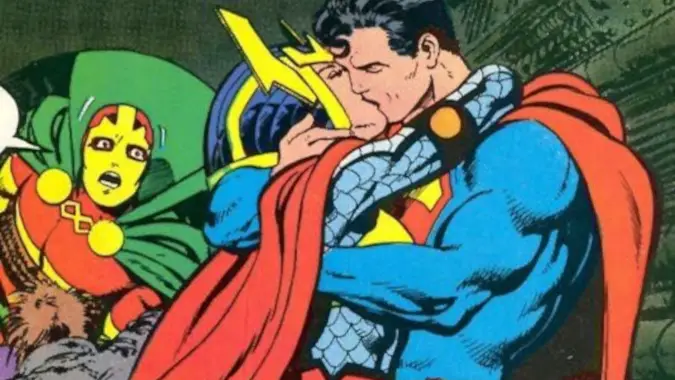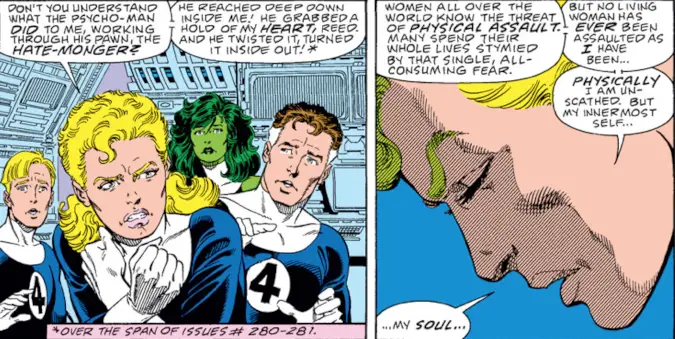The Queue: Hey, kids, Comics! Are often terrible!

Yeah, this one was a doozy all told. Yerac wants to hear my thoughts about a famous comic book writer and artist who wrote some really yikes stuff, and so, they get their wish.
I didn’t even mention all the cheesecake and exploitation he did with She-Hulk, because compared to this, that stuff was tame.
Question for the Queue: What’s your go to game, when you just need something mindless to play and still gets you that endorphin rush of successful play?
Anything Diablo. Be it D2, D3, DI, even my old copy of original Diablo if I feel like dusting it off. It’s a simple formula but it works. I will also play a game that usually isn’t mindless, but play it mindlessly, like ignoring all the quests in Fallout 4 to instead build huge sprawling complexes with enormous concrete walls and a lot of laser turrets to hold my Powered Armor collection.
I grew up on two TRPG systems, D&D and D6, but have branched out in the last few years with the Cypher System, Vampire, DreadLore, and 2d20. For that reason, it’s been a lot of fun to hear you talk about all of these different TRPG systems, especially their pros and cons. But I also see how overwhelming all this variety can be.
Would you please discuss what you see as the categories of TRPG systems? Categories like narrative, combat, horror, etc. are often used loosely. Given your collective breadth of experience, I think we could all benefit from your take, along with what really defines each category and maybe what systems you see as the paragons of each.
I’m sure we’ll cover this someday on Tavern Watch, but considering that could be a while down the road, I figured I’d at least give my initial thoughts on it now.
For me, the big divide in TTRPG is between Simulation based and Narrative based models of play. D&D has always been Simulation based — it uses maps, strict movement rules, a lot of dice rolling and specific powers, skills, spells and so on with mapped out rules for how they work. It’s not the only game like that, and they’re not all the same — Champions/HERO System is a simulation RPG, with a lot of math and statistics to make even the most secretly a robot player among us happy, for example.
This doesn’t mean there isn’t a narrative element to D&D or other RPG’s with a simulation bent. Modern D&D has broadened its narrative elements quite a bit over the years, but at it’s heart it’s still basically going to try and simulate combat as much as it can.
Likewise, there are quite a few games with a strong Narrative bent, games that are deliberately about storytelling, especially the communal kind of storytelling that is almost like improvisational theatre. White Wolf/Onyx Path games like Vampire The Masquerade and its many descendants, most of the Powered by the Apocalypse games, and a great deal of indie games tend to go for the narrative approach.
Games like Blades in the Dark and Agon are more the Immersive Narrative side of the coin, deliberately trying to use the rules to evoke storytelling — their Simulation aspects are built around facilitating a group story, and elements like BitD‘s flashbacks allow you to make a decision at the table and have it become part of the backdrop, almost like retcons in comic books.
Now, again, there are games that are both in various degrees. Almost all TTRPG’s have rules for things like combat, for example, and there are mechanics in games like D&D that are really only for roleplaying reasons.
Hopefully we’ll get to talk about this on Tavern Watch soon, as it is a subject I could go on and on about.
Burn John Byrne! I wanna hear Matt rant!
First up, I don’t know anything about John Byrne as a person. This isn’t about who he is as a human being. This is purely as a comic book writer and artist. I feel like I should put a Content Warning here. There won’t be any graphic scenes shown or described, but sexual assault is mentioned in some of these examples.
Secondly, as Flan, Ace, and 6K pointed out in follow up to your original statement, there is no shortage of comic book work that danced over — sometimes trampled over — the lines of good taste, rampant misogyny and just mountains and mountains of cringeworthy bad ideas. If I spent all my time writing responses about that in the Queue, I’d never be able to stop. There’s just so much of it. I mean, Avengers 200 exists. That is never getting a movie adaptation and thank Dormammu for that.
Rather than focus on all the various writers/artists suggested (all good suggestions, but again, we’d be here forever) I’ll just mention that as a writer, John Byrne has a tendency to go back to the same idea over and over again. And that idea is basically this — a super heroine/female character that Byrne thinks needs a revamp will be forced through an emotionally torturous storyline, often coming out the other end as a hypersexualized evil version of herself, before eventually being brought back to reason and returning to super heroism. He first did this with Sue Storm Richards, aka the Invisible Girl (at the time) who became the psychotic Malice thanks to a villain basically raping her mind.
That’s not me, that’s what she calls it.

It’s not even like he’s trying to be subtle about it, either. This is a story that basically comes right out and uses a rape allegory as a plot device to explain why she starts calling herself the Invisible Woman.
And like I said, it’s something Byrne would use again and again. His run on West Coast Avengers had the Scarlet Witch go full bore super villain after her husband Vision was dismantled and her children with him revealed to be fragments of a supervillain named Master Pandemonium’s soul (no, seriously) and before she comes out of her ‘I’m evil now’ phase she is depicted as doing something that certainly looks like rape to the character of Simon Williams, aka Wonder Man. The editors literally had to change the scene to make it less overtly Where’s Wanda’s head in this scene.
Byrne’s use of rape as a metaphorical prop, something for female characters to overcome on their way to being revitalized as a superhero, even pops up in work he did for DC. Here’s a panel from a story where he had someone steal Superman’s body and then use it to threaten to rape Wonder Girl before he kills her. And here’s one where he has Superman and Big Barda get mind controlled into making a pr0n film, with the added misogyny of implying that Barda was into it but Superman was too good and pure to fully submit to the act.
So yeah, John Byrne as a person may be lovely, I have no idea. But John Byrne as a writer has some serious problems.
So yeah. That happened. See y’all next week.
Please consider supporting our Patreon!
Join the Discussion
Blizzard Watch is a safe space for all readers. By leaving comments on this site you agree to follow our commenting and community guidelines.
 @MatthewWRossi
@MatthewWRossi



